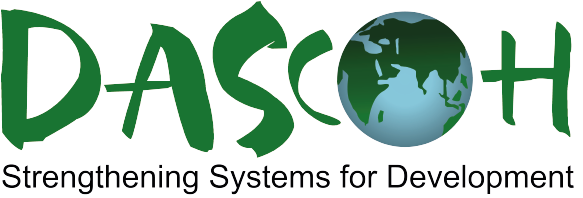Cross-cutting Themes
In our project implementation, across the thematic objectives, we emphasise three cross-cutting issues. These principles guide the work of DASCOH and are embedded in everything we do. They also form the foundation for the professional and ethical conduct of the DASCOH Board and staff.
Inclusive governance
Our project designs and implementation take into account the interplay between the various stakeholders and their interests; we apply a systems approach. Improvements at community level can only be sustained if supplemented with attention to other stakeholders mandated to work in these communities. In supporting the communities, we work through the organisations that are already existing or have been formed to provide community services. These are the government and non-government services at local level, and the CBOs that have direct access to the communities. DASCOH believes that local governments have the legal and constituent power to drive substantive social change. DASCOH’s development strategy is underpinned by empowering the poor – and especially the religious and ethnic minorities – to exercise their voice and client power to hold local governments to account ensuring basic public services for all. We provide support to the local level organisations and promote coordination among them. We develop innovative techniques in working with CBOs and Community Volunteers by building capacities in managing all project phases. In special cases, and as a pilot intervention, DASCOH may provide direct services to communities, with the strategy to hand-over to the responsible agencies.
For increased sustainability, our interventions aim to include higher levels of authorities, ensuring that national level policies will come into effect at the local levels, like for instance focussing on the practical implications of national decentralisation policies.
Focus on Gender Equality
DASCOH recognises that the social status of men and women are unequal. The social position of women is inferior and severely socially oppressed. Gender disparity can obstruct development as a whole. The inbuilt attitude of oppressing a girl child and women in society needs to be changed and equality established. DASCOH has taken up the challenge of mainstreaming gender equality in its projects and interventions. Our efforts to promote gender equality and equity are in line with Article 10 & 28 of the constitution of Bangladesh and SDG 5. DASCOH is committed to protect discrimination, women empowerment as well as to make our organisation gender sensitive with gender responsive programmes/projects ensuring sustainable change.
Conflict Sensitive Programme Management (CSPM)
DASCOH is committed to mainstreaming CSPM in its projects, contributing to the principle of ‘Do No Harm’, integrating conflict and environmental sensitive approaches into the design and implementation of all programmes. We adopted CSPM to better understand the context in which we work, to understand the interactions between our interventions and context; and subsequently to improve our interventions. In this way we intend to minimise negative impact and maximise positive impact.




